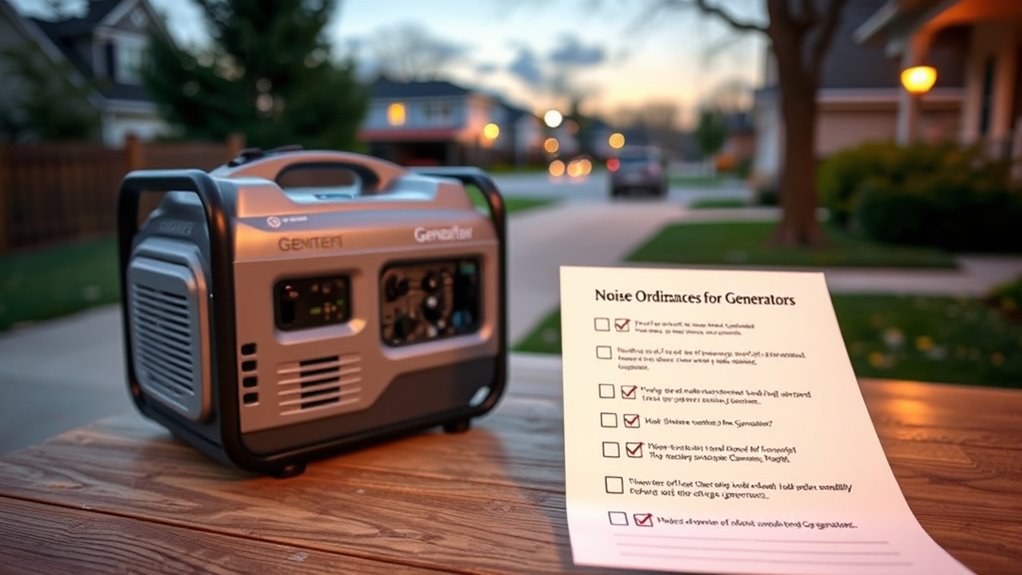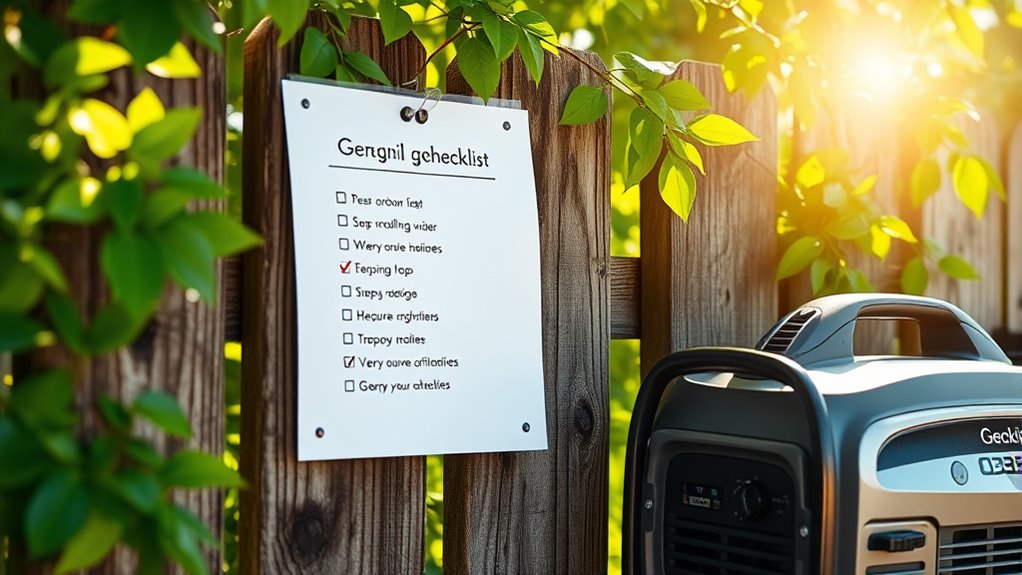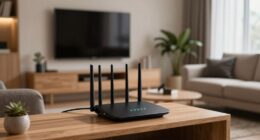Before you start your generator, check your local noise ordinances to avoid fines and neighbor disputes. Make sure you know the approved noise levels for your zone, typically 65 dB(A) during the day and 60 dB(A) at night. Obtain any necessary permits, especially if operating during quiet hours or in sensitive areas like hospitals or schools. Remember, enforcement often relies on sound measurements at the property line—so knowing the rules helps you stay compliant. If you proceed, you’ll find more helpful details below.
Key Takeaways
- Check local noise level limits (typically 60-65 dB(A)) for your zone and time of day.
- Obtain any necessary permits or noise variances from local authorities before operating.
- Ensure generator placement adheres to setback distances and quiet zone regulations around sensitive areas.
- Use mufflers and exhaust restrictions to minimize noise and comply with legal standards.
- Verify operating hours restrictions and ensure your generator operates only during permitted times.
Key Noise Regulations for Generator Use

Understanding noise ordinances for generators is essential to prevent fines and guarantee community harmony. Before you fire up your generator, it’s important to know the rules that regulate noise levels, locations, and operating times in your area. These ordinances are designed to control sounds based on where you are, the time of day, and how far the noise travels. Many communities use the *plainly audible standard*, meaning if your generator’s sound can be heard beyond a certain distance, it may be considered a violation. This standard helps enforcement when measuring noise, especially if officials don’t have a decibel meter handy. It’s important to recognize the types of sounds regulated, including mechanical noises from generators, musical instruments, shouting, or construction equipment. Knowing what’s restricted can help you avoid trouble.
Understanding noise ordinances helps prevent fines and promotes community harmony when operating generators.
Most noise ordinances specify decibel limits that vary depending on the time. For instance, during the day, a limit might be 65 dB(A), while at night, it could drop to 60 dB(A). These limits often apply differently depending on your zoning—whether you’re in a residential, commercial, or industrial area. Some ordinances also have special rules for specific sounds like emergency signals or fireworks, which may be exempt during certain holidays but regulated at other times. If you’re planning to use a generator during quiet hours, usually from 10:00 p.m. to 7:00 a.m., you need to be especially cautious. Testing or operating your generator during these times without an emergency exemption can result in fines or mandatory shutdowns.
Time restrictions are strict in many areas. Operating a generator outside permitted hours without prior approval can lead to penalties. Some communities offer noise permits, allowing you to temporarily exceed limits for events or specific needs, but you’ll need to go through an application process. Quiet zones around sensitive locations like hospitals, schools, or churches often have more stringent restrictions, making it even more critical to understand local rules. Seasonal or holiday-specific relaxations may apply, but only if you’re aware of the regulations. Many jurisdictions measure noise levels with official sound level meters, but enforcement often relies on the “plainly audible” standard, which depends on whether a sound can be heard at the property line. Furthermore, some areas have specific restrictions on generator mufflers and exhaust systems to minimize noise pollution.
Lastly, obtaining the necessary permits before installing or operating your generator is essential. Larger units or those in sensitive zones often require approval, and variances might be granted if you meet certain conditions. Hiring professionals during installation ensures your generator complies with noise, safety, and fire codes. By understanding these regulations, you can operate your generator responsibly, avoid fines, and maintain good relations with your neighbors. Always check with local authorities beforehand to confirm your plans align with current noise ordinances.
Frequently Asked Questions
Are There Different Noise Limits for Residential and Commercial Areas?
Yes, there are different noise limits for residential and commercial areas. In residential zones, the limits are stricter, usually around 55 to 65 dBA, especially at night, to prevent disturbance. Commercial areas allow higher noise levels, typically between 62 to 67 dBA during the day and slightly lower at night. You need to check local regulations, as these limits can vary depending on your location and specific zoning rules.
How Do I Measure Generator Noise Levels Accurately?
To measure generator noise levels accurately, you should use a calibrated sound level meter positioned about 7 meters from the generator at a 45° angle. Take multiple readings at different points around the generator, then calculate the logarithmic mean to find the true noise level. Confirm the generator is at full load, avoid reflective surfaces nearby, and record ambient noise beforehand to isolate generator sound.
Can I Use Noise Barriers to Reduce Generator Sound?
Think of noise barriers like walls in a castle, protecting you from invading sound waves. Yes, you can use noise barriers to reduce generator sound. They work by physically blocking and reflecting noise away from sensitive areas. Properly designed barriers—made from dense materials like concrete or wood—can cut noise levels by 10-20 dB, making your generator much less disruptive while still allowing airflow and maintenance access.
Are There Penalties for Violating Noise Ordinances?
Yes, there are penalties for violating noise ordinances. You could face fines, community service, probation, or even jail time if you repeatedly or severely breach the rules. Usually, you’ll get a warning first, then penalties escalate with each violation. Enforcement officers document violations, measure noise levels, and may issue citations. To avoid penalties, verify your generator complies with local noise limits and follow all regulations.
Do Noise Regulations Vary by Time of Day or Season?
Yes, noise regulations vary by time of day and season. You’ll find stricter limits at night and during quiet hours to prevent disturbances, especially in residential areas. Seasons also influence rules, with some regions relaxing or tightening restrictions based on outdoor activity levels or environmental factors. To stay compliant, you need to schedule generator use accordingly, considering these time and seasonal variations to avoid fines or noise complaints.
Conclusion
Understanding noise ordinances ensures you stay compliant and keep your neighborhood peaceful. Did you know that according to the EPA, noise pollution affects over 30% of urban residents? By following these generator noise regulations, you not only avoid hefty fines but also contribute to a quieter, more harmonious community. Keep this checklist handy, operate responsibly, and enjoy your power source without disrupting those around you. Quiet operation benefits everyone—so stay informed and considerate!










